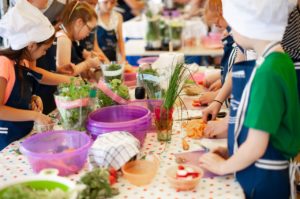 I recently read that there has been a surge of families interested in homeschooling thanks to the Covid-19 pandemic.
I recently read that there has been a surge of families interested in homeschooling thanks to the Covid-19 pandemic.
As someone who was homeschooled for several years, I have some tips to share for anyone who is planning to or thinking about homeschooling their kids this year.
Before we dive into the meat of this post, please note that homeschooling during a pandemic or other crisis is much more difficult than it is in ordinary times.
My parents had the luxury of time to research homeschooling thoroughly before choosing it. Their main concern was which curriculum to use and how closely to follow it, not whether any of us would catch a dangerous illness during our weekly trip to the library or grocery store.
Please go easy on yourselves. There are many different ways to learn, and most children are adept at soaking up knowledge no matter what’s going on around them. I know that my siblings and I did quite well once we transitioned to public school. In fact, we were ahead of our peers in certain areas like math and reading.
Tip #1: Discover and Pursue Their Interests

This isn’t me. I simply enjoy the peaceful imagery in it.
Whether they love computer games, sports, poetry or something else entirely, there are ways to tie many different interests back into academic subjects.
To give one concrete example, a kid who is obsessed with Minecraft might also enjoy learning about coding, computer science, history, problem solving in math, or environmentalism if it can be tied into his or her favourite game in some way.
Tip #2: Look for Non-Worksheet Learning Experiences
I must confess that I actually enjoyed our homeschooling worksheets, but that was because they were limited. We did a few of them a day and then moved onto other types of learning. Daily routines can be filled with learning opportunities for students of all ages.

Also not me, but great hands on learning!
Doubling (or halving) a recipe is a fantastic way to practice fractions and mental math in elementary school. Older students could figure out the cost per ingredient, serving, or entire batch of food, and that’s before we get into the cost of substitutions or how many batches of chocolate chip cookie dough they’d have to make to fill their entire room with cookies.
This same pattern could be followed for home repairs, automobile repairs, gardening, doing laundry, cleaning, and so much more. One of the things I didn’t enjoy about public school once I eventually switched to it was how much harder it was to translate all of the knowledge they expected us to learn into anything that was relevant to my daily life.
Homeschooling makes it much easier to show why it’s important to understand chemistry when deciding if you should mix bleach and ammonia* or how quickly compounding interest adds up when you’re deciding how much to charge to your 30% interest credit card or thinking about saving for retirement.
*Never do this!
Tip #3: Go on Field Trips
 No, this doesn’t have to involve being around other people or visiting museums.
No, this doesn’t have to involve being around other people or visiting museums.
There were times when our “field trips” were a walk to a local park and a conversation about the plants and animals that we spotted there. This doesn’t have to be complicated or cost much (if any) money at all.
Some of my favourite field trips growing up were the ones we took to cemeteries and bigger parks in rural areas. My siblings and I had so many questions during these excursions:
- What do butterflies eat?
- Why did so many people die young in the 1800s?
- Why does this stone look nothing like that one?
- Who was the first person who ever decided to drink cow’s milk?
- How do trees know when it’s time to drop their leaves or grow new ones?
- Why would someone build a house out in the middle of nowhere?
Mom and dad answered our questions when we were very young. They also encouraged us to look up the answers on our own, especially as we grew older and could do things like read an encyclopedia or search the Internet.
Some of our questions didn’t have straightforward answers, but many of them did. The more we learned, the more we wanted to know. My lifelong interest in history came in part from the many historical sites my parents took us to when we were on vacation or even simply bored and wanting to explore local history.
Reading about historical events became more appealing to me in middle and high school, but I really liked being able to tie that chapter or book back to my memories of visiting places that were somehow connected to that era.
Tip #4: Offer Many Different Types of Books and Audiobooks

Still not me. You all know the drill by now.
Think fiction, non-fiction, bestsellers, classics, graphic novels, and more. I was the sort of bookish kid who happened to enjoy a lot of classic novels, but it always bothered me when adults used me as an example for kids who maybe struggled with reading, didn’t enjoy it in general, or who simply found the classics uninteresting.
Not everyone will enjoy the same stories or subjects, and that’s totally okay. If someone wants to listen to an audiobook of their favourite Spiderman graphic novel, good for them! Their minds are still processing that information, maybe learning some new vocabulary words, and (hopefully) following the storyline closely to see what happens to their favourite superhero next.
Tip #5: Let Them Get Bored

I’ll leave it up to all of you to decide whether this is me. 😉
As you might have already guessed, my parents slid closer to the unschooling side of the homeschooling continuum than they did the traditional one. That is to say, we had a lot of say in what we learned and how far we followed each rabbit trail as we discovered new interests.
Yes, of course we learned how to read, write, and do math. But our brand of homeschooling was a pretty casual one beyond that point. We went to the library about once a week to stock up on whatever books looked interesting, and then we were given a lot of freedom to decide what we learned and when.
Given that we lived in Wyoming for most of our homeschooling years, this did lead to times of boredom when snow was falling heavily outside. We either had to read books, write our own stories, study topics that interested us, or try to get one of the few channels on the TV to work.
These hours of freedom created kids who knew how to entertain themselves, teach themselves, and carve out their time wisely.
And, honestly, that’s been a real advantage for all of us in our adult lives.
If you were also homeschooled, what other tips would you give homeschooling families as the school year starts up again?
